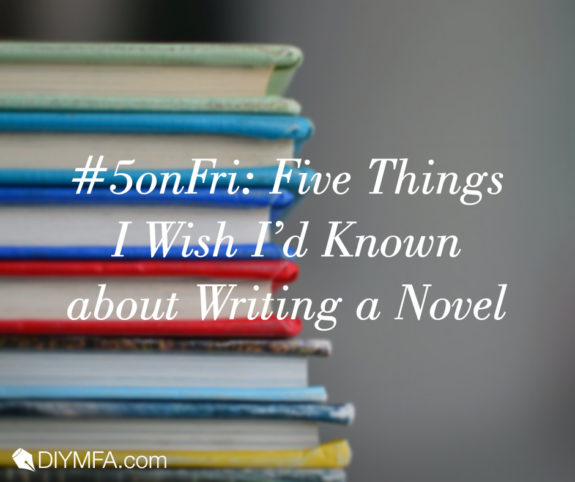Too many novels go unfinished. Writers give up in frustration because they run out of ideas, they get stuck, or they become overwhelmed by self-doubt. This often happens because writers have unrealistic expectations about the novel-writing process.
Through my own struggles with writing a novel, as well as my work with other writers, I’ve seen this firsthand. Cultivating the right mindset about writing a novel is just as critical to success as understanding the craft of it.
Here are the five things about writing a novel that I wish I’d realized sooner.
1. Let yourself be a beginner at writing a novel.
When you first start writing a novel, you are a beginner, no matter how much writing you have done before. You will struggle with description, you will write flat characters, and you will agonize over making dialogue sound real.
It’s even more frustrating if you’re an avid reader, and you know what good storytelling and good writing look like. You may think you’ll be able to easily replicate advanced skills in your story.
What you’re experiencing is a gap between your taste and skills. Ira Glass explains: “All of us who do creative work, we get into it because we have good taste. But there is this gap. For the first couple years, you make stuff, it’s just not that good. It’s trying to be good, it has potential, but it’s not. But your taste, the thing that got you into the game, is still killer. And your taste is why your work disappoints you.”
Writers give up in the early stages of the first draft because they don’t understand how their writing could be so bad—especially if they’ve been told before that they’re good at writing. But even if you’ve been good at writing other things, you’re a beginner at writing a novel. So try not to compare yourself to your favorite authors or expect that you should be more advanced. Give yourself the grace to be bad and the permission to practice your craft until it improves.
2. Everyone has to learn how to write a novel.
Our tastes trip us up, but so does a belief in natural talent. There’s a pervasive idea that some writers are just born with it, that a whole and compelling story just flows out of them and onto the page.
However, despite how easy some novelists make this endeavor look, no one is born knowing how to write a book. Yet, so many first-time novelists sit down with the hope that they are a natural talent, and that writing will be easy and storytelling will come effortlessly. If we don’t get our first draft perfect on the first try, we might believe it’s a sign that we don’t have the gift and we can’t do it.
In reality, you have to learn. Even if you have plenty of experience writing articles and short stories, you still have to learn to write a novel.
A novel’s conventions are not like any other piece of writing. A novel is also such a large-scale project that it requires a different approach. Learn about story structure and character development. Try out different planning methods and writing habits. Look at a novel as something you have to learn how to do.
3. You don’t have to do it on your own.
Along with the genius myth, we also believe that writers do their work alone. And while the act of writing is generally solitary, working on a novel should involve outside input. We get so close to our own work that we can’t evaluate it objectively. Getting outside perspectives on your story will help you see the problems that you can’t identify on your own. And help abounds to get your writing and your story in the best possible shape. DIY MFA, writing groups, critique partners, coaches, editors, workshops, and more are all available to you.
You also don’t have to wait until you already have a draft to get help. Want to skip years of writing in circles, trying to figure out on your own how to raise the stakes of your novel or make your characters more believable? Take a class or work one-on-one with a book coach.
Asking for help doesn’t mean that you’re not cut out to write; it’s just a more efficient way to learn and hone your craft.
Getting help will better prepare you for traditional publishing as well given that the industry is more competitive than ever, and agents don’t have as much time as they once did to help promising writers develop their skills. As such, they’re less likely to take on a writer who’s not quite there yet. So before you query, you should take advantage of any opportunity you can to learn new skills, get feedback on your work, and make your draft the best it can be.
4. Editing will take longer than drafting.
Many beginning writers think that the hard part of the process is completing the first draft; then all the story needs is a polish, and the book is ready to publish. They wind up discouraged when they either finish the draft and find it’s a mess, or they try to query a story that’s just not ready and get continually rejected.
Instead, go into your first draft with the mindset that your novel will be far from done when you type “the end.” In fact, in the case of your first novel, the editing process will likely take the bulk of your time. You can’t see the scope of your novel until you’ve completed a full draft because you discover so much about your story and your characters along the way. And then you can see what’s working and what isn’t.
Ultimately, your first draft will need a massive story-level edit before line edits. Plan to spend significant time on that step of the process.
5. Persistence is more important than talent or natural ability.
Given the debunked myth about natural talent, the thing that separates successful writers from—well, writers who do not publish or do not finish—is persistence.
It takes time to learn, to practice, to develop your skills, to revisit your story over and over to make it better, to work with others and apply their feedback. But writers who think that talent is all it takes will not realize they need to put in this effort; they will never see their skills improve because they give up when the work gets hard.
I’ll admit that this happened to me on more than one draft. I felt like my terrible first drafts were a sign that I couldn’t write well, and I’d never get better. I just never got better because I kept quitting.
So remember, your writing and storytelling skills can be improved, but only if you’re prepared to stick it out through all the tough times.
With the right mindset, you can learn to look at those challenges as opportunities for growth, rather than warning signs that you’re doing it wrong.
In fact, if you have the mindset that writing a novel takes continual learning and practice, and you show up to write consistently, you’re doing it right.

Heather Campbell is a book coach who helps writers develop tools to overcome their perfectionism and mindset blocks so they can create lasting and effective writing habits to complete a novel. When she’s not immersed in fiction, she’s running in the fresh mountain air of Colorado or snuggling with her rescue dog, Chase. Find out more at www.thewriterremedy.com and follow her on Instagram!







